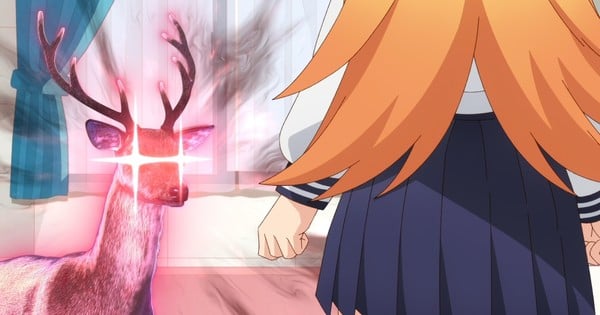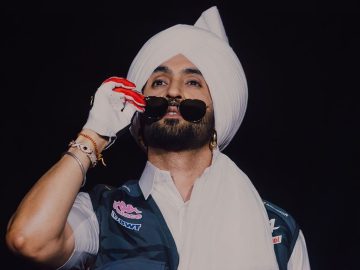My Deer Friend Nokotan made a big impression before its premiere with an hours-long video and other social media efforts to stay at the forefront of the otaku consciousness. Did it work?
Disclaimer: The views and opinions expressed by the participants in this chatlog are not the views of Anime News Network.
Spoiler Warning for discussion of the series ahead.
My Deer Friend Nokotan, Bakemonogatari, Mayonaka Punch, Future Diary, Blend S, Attack on Titan, Birdie Wing, Brave Bang Bravern!, Metallic Rouge, Pop Team Epic, Dropkick on My Devil!, and Bocchi the Rock! are currently streaming on Crunchyroll. Akiba Maid War is available on HIDIVE.
Chris
Nick, ever since Steve got Arataka Reigen recognized as an internet sex symbol, the management has been on us to move toward more memetic social media notoriety! We need to get people posting, and we need to do it quickly. Any ideas on what we can do to get the recognition we so obviously deserve?
Nick
Well, hot takes always seem to rile up the hornet’s nest, formerly known as The Internet, so we how about we go all Yorgos Lanthimos and start killing a sacred deer?

That’s also the plot of Princess Mononoke if we wanted to keep it entirely anime-focused. But no, you’re right; there’s a much more notable deer right in front of us this season just asking to eat the front fender of a speeding pickup.

So yeah, if you heard of any show this season before it premiered, it was probably My Deer Friend Nokotan. This show’s marketing team went hard in the paint sooner and more intensely than any in recent memory. Specifically, they seemed to aim to make the show a meme before it even came out. They made a 10-hour video of a snippet from the OP. They commissioned viral artists to do promo art. They allegedly tried to get influencers to promote it for free. I don’t think I’ve ever seen a show so actively court the chronically online like this before.
In the name of fair full disclosure, it must be said that it seemed to work on some people. Least of all: me! I named Nokotan as my Most-Anticipated anime of the season in our quarterly collaborative feature, based entirely on that outsized shitpost energy, and I wasn’t the only one.
In my defense, my runner-up was the newest sequel season to Monogatari, so my tastes are eclectically my own. Though Monogatari, especially in its earlier entries, arguably made something of a meme out of itself as well.

Anime is a nerdy medium, so it’s no surprise that memes and in-jokes are littered across the landscape. You literally cannot escape the Dead Yamcha gag no matter where you go:

However, I think there’s a difference between a show including memes in its repertoire and trying to become a meme itself. That’s a much more recent tactic and one I don’t really vibe with.
Anyone from my now-ancient internet demographic knows that one of the golden rules of this material is that you cannot force a meme. Being “memetic” by definition requires the catching-on to happen independent of any internal efforts.

It’s like when people would make fake accounts for brands like Nihilist Arby’s but then stop once actual brands started trying to be hip with it. Once Wendy’s is telling people to go to hell and KFC makes a dating sim for April Fool’s, the fun stops.
Admittedly, Nokotan is still better off than when Sony bet on people’s memes about not watching Morbius to get them to watch a rerelease of Morbius. But it doesn’t help when all this promotion as the Next Big Internet Joke is premature. When the actual Nokotan show dropped, its actual jokes didn’t quite measure up to the energy of its previews.


It was weird because I’d read the manga’s first volume, and…it wasn’t a particularly memetic kind of comedy. At least, not more than any modern gag series. While it has its fair share of references, the main draw is the same absurdism that plenty of other gag comedies use. Nokotan does something weird or random, Koshi reacts as the straight man. Rinse, repeat.
I should stress that I don’t out-and-out dislike the anime thus far (I would hope not; I’m on the hook for figuring out how to review it for like ten more weeks), but the humor isn’t as idiosyncratic or as rapid-fire as something like this needs to be to hit the level of genre standard-bearers like Pop Team Epic or Nichijou. Tying into that social media strategy, a lot of the time the show seems to be cloyingly begging to be screencapped.

Also, if I can be a contrarian for a moment: No, show, you don’t get to make your own 10-hour loop video. That’s what the fans, the people, the online proletariat decide. Your job is to create something good enough that somebody will spend hours rendering a non-monetizable video for the love of the game. Stuff like this:
It gets its meaning from the fact that nobody was paid to make it. Back off.
It should be easy, too. Goofy OP riffs and remixes are arguably one of the most common forms of anime catching on meme-wise. I’m pretty sure more people know Blend S from the first five seconds of its opening song than anything in the actual show.
Hell, it’s been a thing for well over a decade. I was in the trenches when Attack on Titan’s OP was the inescapable in-joke. There were so many edits that people started complaining about them, and somebody made an edit out of those complaints.
Whenever I hear that song, I still think about the chain that led to this absurd thing. It’s funny because it grew out of organic fandom interaction and, perhaps more importantly, came out of a show people already knew they enjoyed following.
The aforementioned Monogatari is another case. I liked the show, but seeing dozens of remixes of Renai Circulation and Platinum Disco was also a key part of the fandom at the time. This sort of stuff is with any proper fandom.

More than anything, that’s what I object to as far as Nokotan’s claim to the landfill recliner that constitutes the Meme Anime throne: it doesn’t feel organic. It feels like somebody in marketing decided this was the best way to make the show stand out, so it seeks to replicate what other shows have done. Hey, have other anime gone viral for referencing other popular anime? Better put a Tokyo Revengers cameo here, even though it wasn’t in the source material.

Series like Gintama get attention for being self-aware and making meta comments about anime tropes? Well, we can do that, regardless of whether it has a point or adds to any real punchline.

The irony is it just makes the show seem less confident in itself and what its base material has to offer—that is, a breezy little absurdist comedy promoting the fine prefecture of Nara. It’s not something like Birdie Wing, where the bald-faced insanity (which pointedly was not advertised in the lead-up) would be enough on its own to get people posting.

Also, reference humor can work well when it has a point or builds up to something larger. Take the (now illegal to own) first episode of the Osumatsu-san series, where they filled it with so many parodies of things that the episode got sued out of existence. That whole episode was built around the meta concept of characters from the ’60s trying to find relevance in the 21st-century media landscape, and all the characters became different genres of anime. It was a well-constructed conceit for that unexpected revival and had a comedic angle besides “Hey, remember Total Recall?”

Along those lines, there is precedent for building pre-release word-of-mouth through a creative marketing machine and making it work. My beloved Akiba Maid War initially led with a trailer that played into Cygames and P.A. WORKS’ penchant for “subversive” original series. It begged people to speculate on the obscured elements and turn the lead-up to the show into some unserious ARG.
The key to success there was pretty simple: Akiba Maid War immediately delivered on that promise. It nailed its introduction, combining the cynically sweet world of maid cafes with the criminal underbelly of yakuza crimes with the exact level of tasteless bombast necessary to pull it off. If Nokotan had delivered on its promise of being the most absurd, left-field show of the decade, we wouldn’t be having this conversation.
Exactly. Akiba Maid War’s first episode resulted in a whole bunch of other memetically spread moments independent of what had been in the trailer. Cygames successor series Bang Brave Bravern managed a similar feat (and not for nothing; both shows also feature heavy use of referential humor). It’s why they caught on and even became critical darlings instead of being solely remembered for theme song remixes.

Bravern got people promoting Kona beer. Now that’s successful social marketing.
Bravern actually pulled the opposite. All the pre-release material painted it as a serious, Real Robot show, and the name was the only tell that it was the spiritual successor to the Brave franchise. It wasn’t until the OP dropped that everyone realized what we were really getting. Solid, savvy marketing got that show a lot more word of mouth than it might have otherwise.
In other cases, you don’t have to push the marketing yourself. Just have the fans turn a new series into a meme on their own, and hope you’re lucky enough to have a mangaka capable of growing into the hype.

I don’t even keep up with the new Jump manga myself, and I’m still hearing about Kagurabachi.
See, that’s just one of those serendipitous moments. Though it also stems from the Western Jump fanbase realllllly wanting some new action series. The dissonance of having so much pre-release hype and the near total lack of actual material to justify that hype got alchemized into enough attention that Kagurabachi’s a genuine success that people enjoy entirely unironically.
Kind of a reverse-Morbius, really. It’s nice when something like that works out, both for the creator and the fans. But on the other hand, it does seem like every season, there are at least a couple of cases of production committees desperately trying to make Fetch happen, and you wind up with something like a Metallic Rouge.

I don’t know why I keep falling for these things.
To be fair, Metallic Rouge did have a kick-ass song, and all its trailers promised were cool toku fights. It never promised to have a coherent story or any idea what the hell it was doing.
But really, that’s all the marketing side. If Nokotan really wants to be the big, loud, random comedy for Terminally Online, it has one big hurdle it must overcome. Well, technically two small hurdles that are giving it the finger.

Yeah, I name-dropped it earlier, but Pop Team Epic seems to be the meme that Nokotan wishes it was. The series was pretty much purpose-built for that kind of popularity, but it was baked in because the original manga already was successful as memes from a creator whose previous fan comics were also major meme machines.

Plus, said fan comics were based on Touhou, which filled out its own meme galaxy. It was, as we cleverly called things back in the day, “meme-ception.”
More than those bonafides, Pop Team Epic worked because it embraced the chaos of its own creation. Yes, it was full of references, some of which were indeed cheap and obvious:

But that was part of it just throwing the doors open and letting dozens of different studios and creators get involved. So one minute, an episode could be an extended series of video game parodies that ended with Popuko threatening to beat a Pokémon to death, and the next, it was something like this:

It’s the shotgun strategy that ensures there’s going to be something that makes somebody laugh at least once every few seconds and also provides a stacked deck of frames for people to snap and slap Impact text over if they want to.

Though if I’m talking about it in the same column where I praise the successes of Bravern, obviously the key commonality is Obari.
It also meant that well, you could get weird with it. You could make an Earth Wind & Fire homage with felt puppets for the hell of it. Nobody was there to say no!
This is a point. For all of Nokotan’s gestures at outlandishness, it hasn’t done anything as a medium-based standout apart from using its dissonant CGI deer.

There’s an alternate universe where the anime did something really stand out with its presentation of that dance scene instead of…whatever this was.

Half of what makes Pop Team Epic’s tales of Hellshake Yano so incredible is the presentation.
There’s a reason why, six years later, we’re all still thinking of Hellshake Yano.

One of these segments was a minute-and-a-half long, and the other was ten minutes. Guess which one felt like it lasted longer.
It’s not even that funny of a bit on paper (ba-dum-tss), but the execution is so novel, so self-aware in its silliness, that it charms you and sticks with you even if you don’t laugh. Beyond any memetic potential, it’s just a cool bit of art you don’t get to see in professional anime.
It feels so weird to be able to describe something specifically positioned as a shitpost as “art.” But then I remember, as someone who’s way too online, that there is, indeed, an art to posting. Pop Team Epic gets that, and that’s why it would be worth seeking out and watching even if you didn’t find out about it by having a bunch of nerds yell about it out-of-context on your social media feed.

Just going back to watch a few episodes made it clear how much more natural these felt from PTE and how much Nokotan is trying to fit a square peg into a round hole. This just wasn’t material built to achieve what its marketing is presenting it to be. So, every added reference, every new crack in the fourth wall, every random meme inserted into a punchline makes it feel desperate. It’s like a standup comedian going on stage and reading Reddit at you for 20 minutes.

As with other elements we’ve covered, an adaptational sensibility can work. Dropkick on My Devil! was an anime that almost seemed at war with adapting its source material at times, throwing in references not just to memes, other anime, and pop culture but to its funding methods and the very fact that it was an adaptation.

The thing is, it fits better with the series’ base tone and, more importantly, actually felt like it had earned it three seasons in instead of frontloading it all before the premiere.
Hell, adaptations that add to their source material can be great. Bocchi the Rock! added a ton of scenes, jokes, and stylistic diversions, but those were always in service of enhancing a sentiment or idea already present. Nothing that Nokotan is doing is inherently bad. I just think it’s not doing them very well.
Bocchi’s an excellent example of a series whose sensibilities let it catch on naturally (unexpectedly, even!), leading to people still posting jokes and edits about it a couple of years later—an eternity in the current seasonal cycle.

It’s also a solid example of a “meme anime,” as we’ve mentioned here—one where I could genuinely see people going and checking out the show specifically because of a goofy clip or edit that crossed their timeline.
It turns out that just making something cool and memorable is a great way to spread the word all on its own. I’ve been harsh on Nokotan because I think it’s writing a check its comedy can’t cash, but if it can find its own identity or just execute its jokes better, it could still be a worthwhile watch. Just…let it happen naturally, guys. If you keep trying to call yourself T-Bone, it’s only a matter of time before you’re Koko to everyone in the office.
Let’s hope that’s a lesson these deer friends learn before they’re futilely trying to recreate loss.jpg






